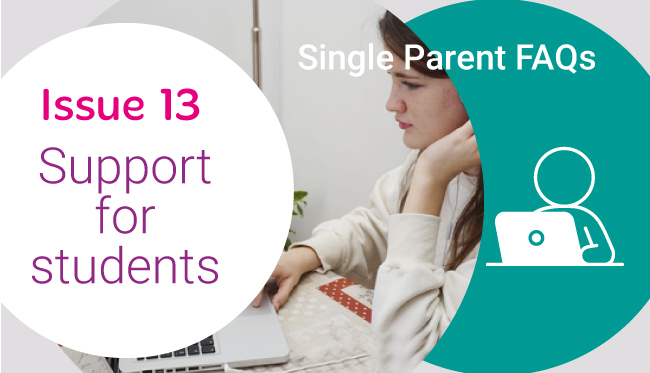Single Parent FAQs: Support for students

01/06/2022
Our advice and information team who work on our Lone Parent Helpline, webchat and Ask a Question feature, receive questions from single parents around Scotland every day.
Our new feature – Single Parent FAQs – on our newsletter and blog spotlights Frequently Asked Questions on a different topic each month.
This month, our advice team have been receiving a lot of calls from single parents regarding higher and further education.
For more information about becoming a student see our information, talk to a Student Adviser at the college or university or call the Lone Parent Helpline on 0808 801 0323.
Take a look at the FAQ's
What is the difference between further and higher education?
Further education courses could include Nat5s, Highers, intermediates and some access courses. It also covers Advanced Highers, vocational and leisure courses including some apprenticeships.
Higher education courses include HNCs, HNDs, degrees and postgraduate level courses.
The college or university can tell you if a course is further or higher education, full-time or part-time.
What money would I get if I want to study further education?
If you want to do a further education course and are getting benefits like tax credits, Housing Benefit or Universal Credit you may be able to keep them while you study.
If you leave work or reduce your working hours to study, you can apply for Universal Credit.
You may be expected to look for work to get Universal Credit, but your course may count as a step towards getting ready for work. You would need to talk to someone at the Jobcentre about this before starting your course.
If you cannot get Universal Credit you can apply for a bursary from the college.
What money would I get if I want to study higher education? I want to do a degree.
The money you will have to live on if you are doing a higher education course comes from the Student Awards Agency Scotland (SAAS). You will get a loan and grant. You may also be able to get Universal Credit at the same time.
Will I have to pay for my course?
Most Scottish students will not have to pay course fees. There are exceptions for some vocational courses and students doing a second degree.
Will I have a lot of debt when I finish my course? I’m worried about how I’ll pay it back.
You will not have to pay back any benefits, the further education bursary, or any grant you get from SAAS.
If you do a higher education course, you do have to pay back the loan which is around £7000 per year. If you want to do a 3 or 4 year degree you will have a lot of debt at the end of it. However, the money does not have to be repaid until you start earning over £2,114 gross per month and repayments are made in small monthly amounts.
Is there help if I want to study part-time?
If your course is part-time and you are getting tax credits or Universal Credit, you may be able to keep these while you study. Part-time study may fit better with the steps Jobcentre asks you to take towards finding work.
There are grants to help with many part-time course fees.
Is there help to pay for childcare costs?
The Lone Parent Childcare Grant can help with the cost of registered childcare. You can also ask for more help from the college or university.
Can I work and study at the same time? I don’t think student funding will be enough.
If you have the time and childcare, you can work and study at the same time. Any income you get would reduce the amount of tax credits or Universal Credit you get so it’s a bit of a balancing act to find what’s best.
What if I can’t manage on the money I get? I’m worried that I won’t have enough to live on and need to drop out of my course.
If you are struggling to manage the money you have while studying talk to a Student Financial Adviser before leaving your course. They may be able to help you with money from Discretionary Funds. This is a pot of money colleges and universities are given to help students in this situation.
There are also funds to help if you have an illness or disability and need extra support or equipment.

See our previous issues of Single Parent FAQs on:
- Having a baby
- Housing options
- Child maintenance
- Child contact
- Universal Credit
- Getting back into education as a single parent
- Financial support for single parents
- Bridging payments and help for Christmas
- Social Security Scotland
- What happens when my child gets older
- Separation and divorce
Remember you can submit your own question via the Ask A Question feature on our website any time and our expert advisers will respond.